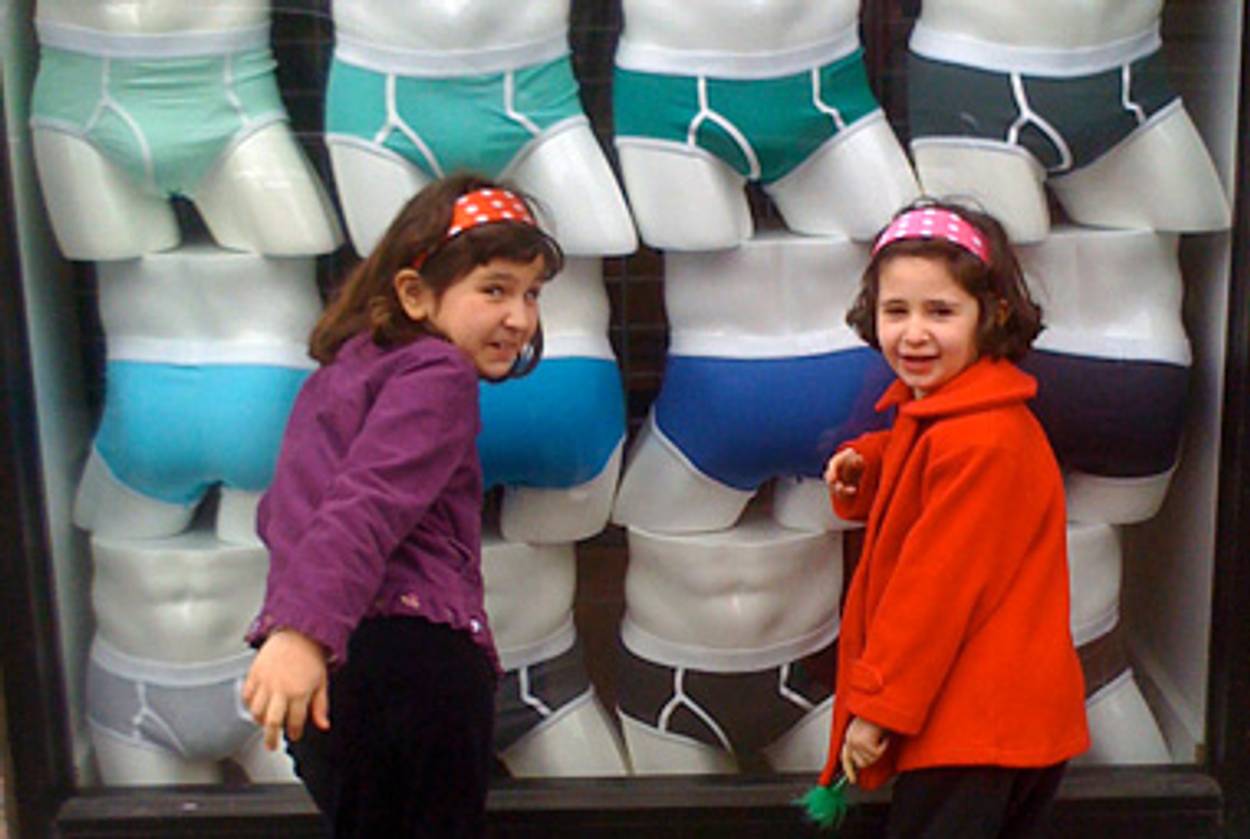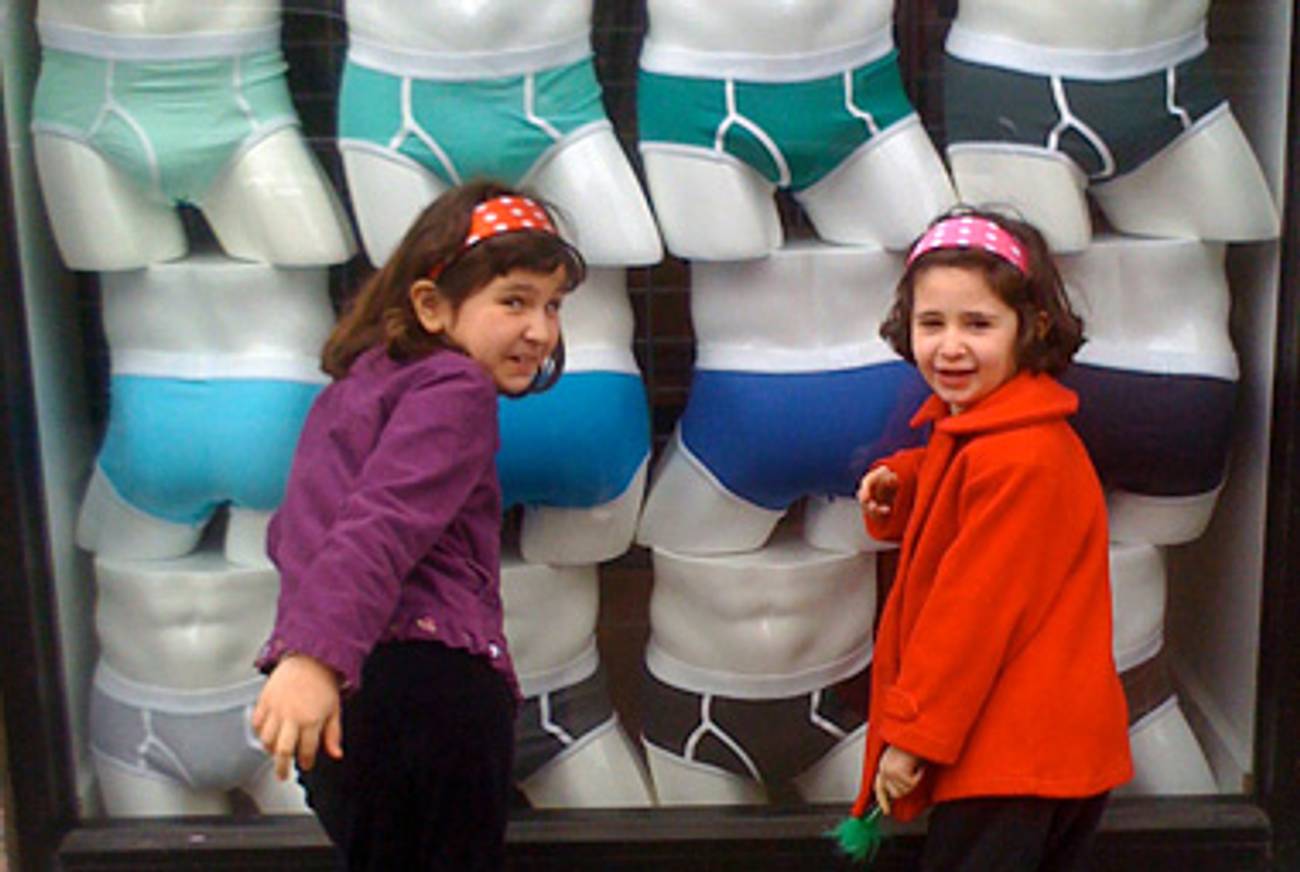Butt of the Joke
Why do my kids laugh at poop?




It’s like living with two tiny Shalom Auslanders. My children crack each other up by yelling “diarrhea!” at inopportune moments. They inform me, somberly, that “people think it’s gross, but it’s really great on toast,” before dissolving in a puddle (hmm, maybe that was an unfortunate metaphor) of giggles. They are madly in love with the ancient Hebrew school classic, “There Were Five Constipated Men in the Bible.” (“There was Cain; he wasn’t Abel! There was Balaam; he couldn’t move his ass! There was Joshua; he blew the walls down!”) Maxine, who is just learning to write, recently passed me a folded-up note and whispered, “This is a secret.” I unfolded it. Written thereon was the word “poop.”
But seriously, folks: Why is poop humor funny? I asked Maxine for her opinion. “Because it goes into the toilet and it’s tasty!” she answered, cracking herself up before ricocheting away.
“Anything about privates is funny,” Maxie’s older sister, Josie, told me. “Because they’re privates!”
Her reasoning may be circular, but it’s not wrong. I consulted my favorite child-rearing expert, Kiki Schaffer, director of parenting, family, and early childhood at New York’s 14th Street Y. “When kids are spreading their wings and trying to be free, scatological humor is resonant. They understand that it’s illicit, secret, private. We’re a culture that is so uncomfortable talking about bathroom habits, and little guys pick up on that. And what a thrill it is to get a rise out of your parents, or a giggle,” she told me. Kiki’s advice: Ignore it, don’t feed the monster, and it will eventually disappear.
Child-development specialist Betsy Brown Braun, author of Just Tell Me What to Say, suggests explaining to a child, “I know you really like to say words like poopie and pee pee and tushie. Those are words that you may say with your friends who want to talk that way or when you are in your own room. Those are not words that grownups want to hear.” She also recommends using real words instead of cutesy euphemisms for body parts and processes, so kids don’t get the idea that they’re shameful. (But if they’re not shameful, why do you have to go to your room to say them?) She further suggests teaching kids other jokes, other ways to be funny.
Good advice. But as Kiki (who also runs a new moms group at the Y) points out, adults find body processes endlessly entertaining too. “When new moms get together they love talking about poop,” she says, “And it’s always, ‘Wow, I never thought a year ago I’d be discussing this so much.’ ” My father, olav hashalom, went to his grave thinking farting was the funniest thing in the universe. His self-installed Mac error sound was the Monty Python line “I fart in your general direction!” (When he was working on his laptop in my kitchen, I’d hear it over and over.) In his ethical will, he commanded my brother and me, “Belch loudly at the dinner table. It is a compliment to the chef, and a long-established Ingall tradition.” And without pee, Sarah Silverman would have no career. Without poop, Larry the Cable Guy would actually be installing cable.
Jews have a fine tradition of scatological humor. You’d think we’d be all cerebral and Woody Allen-y, but even intellectuals know that bean-blowing can be art. Which explains this joke: Mrs. Kahn, an elderly member of the shul, has a little problem with kleptomania. But she’s a nice old lady and it’s really a mitzvah not to embarrass her, so the rabbi simply keeps an eagle eye on her behavior in the sanctuary. After services one Saturday the rabbi tells Mrs. Kahn, “Shabbat Shalom” and shakes her hand, causing a candlestick that had been on a table on the bimah to fall from her sleeve. The rabbi sighs and picks it up, then pats her on the back, and a siddur falls out of her jacket. “You know, Mrs Kahn, you can borrow a book whenever you like,” says the rabbi. Mrs Kahn finally turns to go, and as she does she lets out a stupendous fart. The rabbi exclaims, “Oh, Mrs. Kahn, not the shofar!”
Why are smart people so amused by anal acoustics? “You don’t have to be a child to love taboo subjects,” explains Harvard anthropologist Melvin Konner, author of The Jewish Body, part of the Nextbook Press Jewish Encounters series. “Sex, bodily functions, death, stupidity, race, and ethnicity—anything you’re not supposed to talk about in a normal way, that’s material for jokes. Freud said joking is about a release of tension; I think that’s still a valid idea. Joking allows you to express things you can’t express in other ways.”
Jack Kugelmass, professor of anthropology and director of Jewish studies at the University of Florida, elaborates. “Scatological humor is about transgression. It’s about crossing a line,” he says.
And it’s ancient. Our people’s texts are full of gross-out humor. When Elijah challenges the prophets of Baal to make their god perform a miracle and they fail, Elijah responds with the snarky suggestion that they yell louder, because maybe their god is peeing. In the book of Proverbs, we learn that “a fool repeats his folly the way a dog is drawn back to eat its own vomit.” Yum.
Humor also defuses the power of what frightens us. My friend Howard Rheingold recently started a blog about his battle with rectal cancer. The blog is called Howard’s Butt, and the background image is a closeup of a statue’s tuchus with Howard’s face imposed on it. “A lot of psycho-social-sexual-mythological energy flows forth from our organ of shit,” Howard observes. So, Howard chronicled (past tense, ptui ptui ptui—his last CT scan was clear!) his treatment in graphic detail. The blog tells people who avoid friends with cancer (since another approach to bodily anxiety is avoidance) what they can and should say. Josie was fascinated by Howard’s butt pages; she instinctively got that Howard’s joking was serious business.
“Humor speaks the unspeakable,” as Kugelmass says. Transgressive giggles help us cope. They also affirm what our boundaries are. Knowing all this helps me put up with the poop talk. Besides, Konner swears my girls won’t still be chanting wiener wiener wiener under the chuppah.
I want that in writing.
Marjorie Ingall is a columnist for Tablet Magazine, and author of Mamaleh Knows Best: What Jewish Mothers Do to Raise Successful, Creative, Empathetic, Independent Children.
Marjorie Ingall is a former columnist for Tablet, the author of Mamaleh Knows Best, and a frequent contributor to the New York Times Book Review.